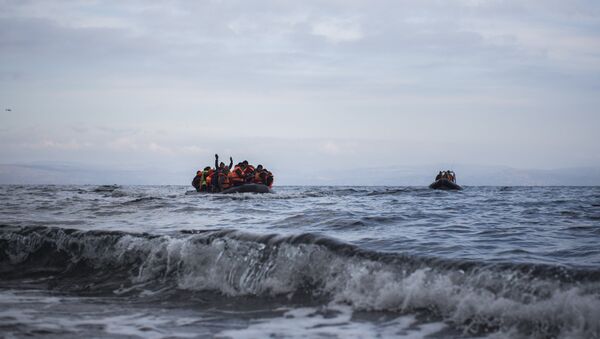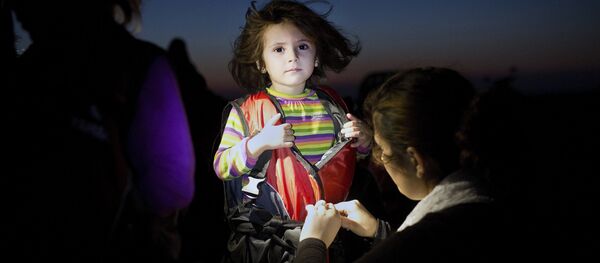2015 will be known as the year a million migrants arrived in Europe. The latest figures from the International Organization for Migration (IOM) and the UN's refugee agency reveals that more than 911,000 people had arrived on European shores since the beginning of the year.
More than 3,600 have died trying.
Europe refugee numbers near one million for 2015: IOM [2015-12-18] https://t.co/PWpTpXl47a #AnonTV #Anonymous #RefugeeCrisis #EU
— AnonTV (@AnonTV) December 19, 2015
Babies/toddlers just arrived in a rubbber boat wearing these vests. The lack of humanity is unbelievable. #Lesvos pic.twitter.com/kLqcorXtAa
— Kety Shapazian (@KetyBrazil) December 20, 2015
While countries argued over paltry quotas and built unofficial borders, many media organizations stopped using the term 'migrant' and instead referred to the people fleeing conflict as refugees and asylum seekers. The differentiation was made — and put into practice.
Migrant is a dehumanising term, and doesn't accurately describe the awful situation these people are fleeing from! #TheWordIsRefugee.
— TheWordIsRefugee (@WordIsRefugee) December 1, 2015
We use the word #migrant, not to exclude refugees, but as a neutral term for people who lack citizenship attachment to their host country
— UN Human Rights (@UNrightswire) December 15, 2015
Violent protests erupted on the Greek border with Macedonia after hundreds of people from Iran, Bangladesh and Morocco were held back from being able to cross into Greece. The authorities separated people depending on where they came from.
The route between Turkey and the Greek islands soon became the irregular route of choice for refugees and migrants trying to reach Europe, overtaking the journey from Libya to Italy which had become increasingly deadly.
More than 800,000 migrants traveled from Turkey to Greece. Lesbos is now the main gateway for refugees entering Europe. Despite predictions that the cold wintry weather and difficult sea conditions would see the numbers of refugees dissipate, the numbers of people arriving by boat in December is higher than in June and July.
UPDATE: Newly arrived Moroccans are protesting in #Lesvos. They're not allowed to register or leave the island pic.twitter.com/2pYx2FCf7Z
— MSF Sea (@MSF_Sea) December 22, 2015
The average number of refugees arriving each day is 3,338. In July it was 1,771.
European leaders have continuously come under fire from human rights organizations for failing to get a handle on the humanitarian crisis on its country's borders. The subsequent US$3.2 billion deal between the EU and Turkey led to further condemnation.
"It's official, the EU has outsourced its dirty work," according to Medecins Sans Frontieres (MSF) which tweeted its response to the news that Turkey has "rounded up" 1,300 asylum seekers to stop them from traveling to Europe.
It's official, the #EU has outsourced its dirty work and Turkey has "rounded up" 1,300 #people https://t.co/rONXxJa9I6
— MSF Sea (@MSF_Sea) December 1, 2015
Next, the European Council (EC) announced plans to abolish the EU border agency Frontex and replace it with a centralized border authority and coast guard to control all the external borders of the EU, in order to preserve the bloc's freedom of movement principle.
LISTEN: 'Most controversial part is sending #EU border #force to a country that didn't ask for it' – @StevePeers https://t.co/TnQMsomkb1
— Sputnik (@SputnikInt) December 16, 2015
Commenting on the EC's inability to tackle the refugee crisis and announcement of a new border force, Luca Visentini, General Secretary of the European Trade Union Confederation said: "EU leaders are completely failing to step up to the scale of the humanitarian crisis inside and outside the EU.
"It is deeply disappointing, and makes life more difficult for the refugees and communities struggling to host them, that our leaders have done little more than agree to carry out previous decisions. Barriers are not a solution. Europe must welcome refugees in a spirit of solidarity and responsibility," said Visentini.
Almost five times as many migrants have arrived in Europe than last year, reaching the million people mark. According to the UN, the number of forcibly displaced people around the world would "far surpass" 60 million by the end of 2015.



